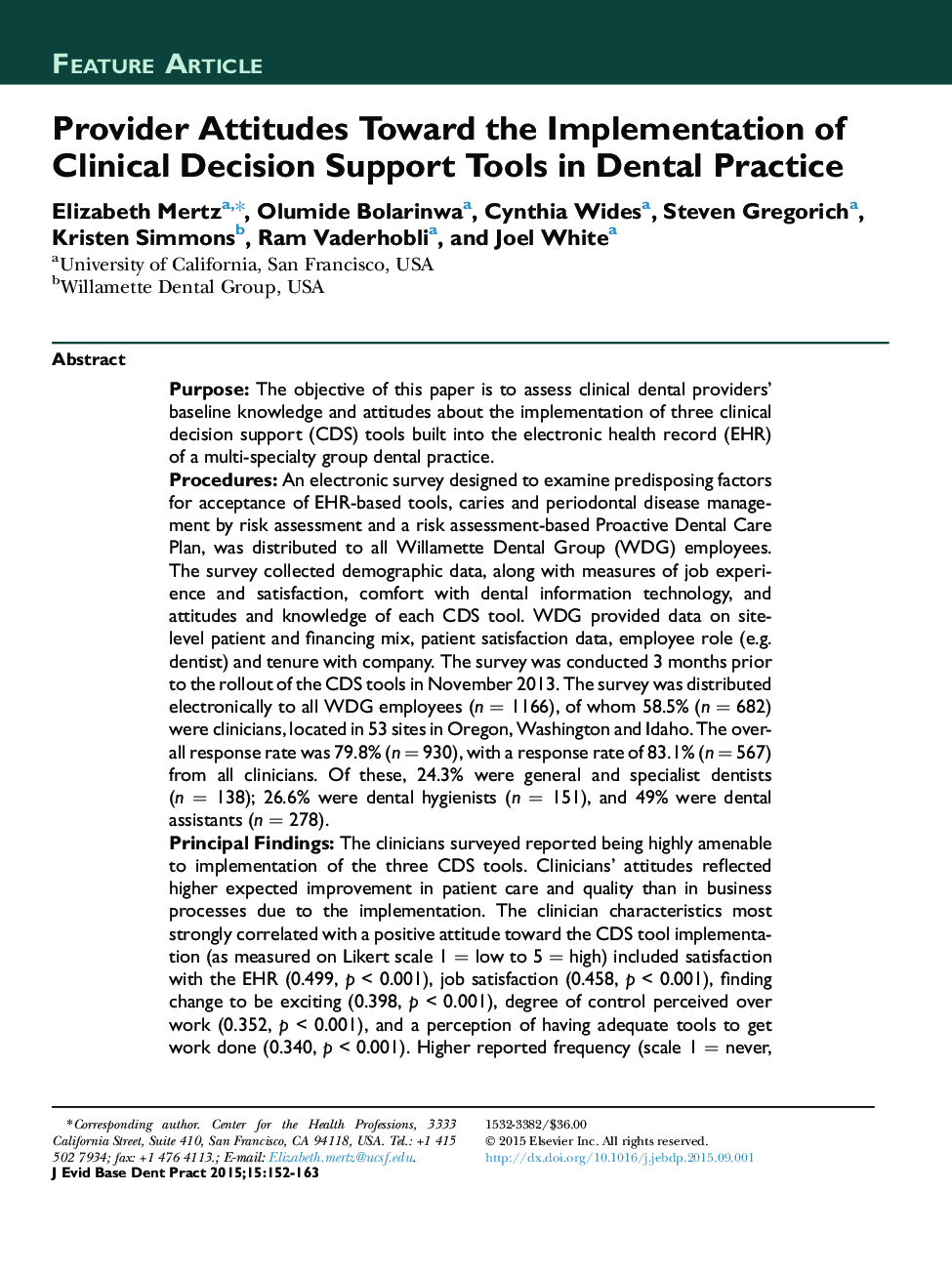| کد مقاله | کد نشریه | سال انتشار | مقاله انگلیسی | نسخه تمام متن |
|---|---|---|---|---|
| 3151658 | 1197915 | 2015 | 12 صفحه PDF | دانلود رایگان |
• We examined provider attitudes toward clinical decision support tools.
• Domain variables were developed from multiple measures of attitude and skill.
• Positive work environment factors correlated with positive attitudes and skill.
• Reported stress and burnout correlated with negative attitudes and skill.
• First study of attitudes of dental clinicians toward clinical decision support.
PurposeThe objective of this paper is to assess clinical dental providers' baseline knowledge and attitudes about the implementation of three clinical decision support (CDS) tools built into the electronic health record (EHR) of a multi-specialty group dental practice.ProceduresAn electronic survey designed to examine predisposing factors for acceptance of EHR-based tools, caries and periodontal disease management by risk assessment and a risk assessment-based Proactive Dental Care Plan, was distributed to all Willamette Dental Group (WDG) employees. The survey collected demographic data, along with measures of job experience and satisfaction, comfort with dental information technology, and attitudes and knowledge of each CDS tool. WDG provided data on site-level patient and financing mix, patient satisfaction data, employee role (e.g. dentist) and tenure with company. The survey was conducted 3 months prior to the rollout of the CDS tools in November 2013. The survey was distributed electronically to all WDG employees (n = 1166), of whom 58.5% (n = 682) were clinicians, located in 53 sites in Oregon, Washington and Idaho. The overall response rate was 79.8% (n = 930), with a response rate of 83.1% (n = 567) from all clinicians. Of these, 24.3% were general and specialist dentists (n = 138); 26.6% were dental hygienists (n = 151), and 49% were dental assistants (n = 278).Principal FindingsThe clinicians surveyed reported being highly amenable to implementation of the three CDS tools. Clinicians' attitudes reflected higher expected improvement in patient care and quality than in business processes due to the implementation. The clinician characteristics most strongly correlated with a positive attitude toward the CDS tool implementation (as measured on Likert scale 1 = low to 5 = high) included satisfaction with the EHR (0.499, p < 0.001), job satisfaction (0.458, p < 0.001), finding change to be exciting (0.398, p < 0.001), degree of control perceived over work (0.352, p < 0.001), and a perception of having adequate tools to get work done (0.340, p < 0.001). Higher reported frequency (scale 1 = never, 7 = always) of feeling burned out (−0.297, p < 0.001), feeling emotionally drained (−0.265, p < 0.001), and feeling work is a strain (−0.205, p < 0.001) had the greatest correlation with negative attitudes.ConclusionThis is the first study to examine dental provider attitudes toward the implementation of CDS tools incorporated within an electronic health record. Provider attitudes toward CDS tools can shape the entire implementation process for better or worse. This study contributes to the literature by providing an understanding of factors related to positive attitudes at the outset of a system change and can help guide organizational administrators to better prepare their workforce and organization for adoption of evidence-based dentistry tools such as a CDS system.
Journal: Journal of Evidence Based Dental Practice - Volume 15, Issue 4, December 2015, Pages 152–163
